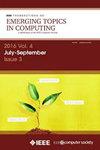Deep Attentive Interest Collaborative Filtering for Recommender Systems
IF 5.4
2区 计算机科学
Q1 COMPUTER SCIENCE, INFORMATION SYSTEMS
IEEE Transactions on Emerging Topics in Computing
Pub Date : 2023-06-20
DOI:10.1109/TETC.2023.3286404
引用次数: 0
Abstract
Collaborative filtering (CF) is a pivotal building block in commercial recommender systems due to its strength and utility in user interest modeling. Recently, many researchers have turned to deep learning as a way to capture richer collaborative signals from user-item feature interactions. However, most deep-based methods only consider nonlinear, high-order interactions while ignoring the explicit collaborative signals in low-order interactions. They also typically ignore the quality of the user and item profiles. These are cornerstones in item recommendation that, we argue, must be considered for high-quality recommendations. Hence, we propose Deep Attentive Interest Collaborative Filtering (DAICF) to overcome these limitations. DAICF profiles users based on their interactive items, i.e., user neighborhood information. Similarly, item profiles are based on users who had interacted with it, i.e., item neighborhood information. Given a user's profile varies over different items, DAICF accurately models his attentive interests based on the specific target item. Low-order collaborative signals are captured by a shallow component, and high-order collaborative signals are captured by a deep component. These two complementary collaborative signals are then fused to provide rich recommendations that cut through today's information overload. By designing a personalized feature extraction method based on bilateral neighborhood information to solve the data sparsity problem in recommender systems, DAICF can dynamically distinguish the importance of a user's historical interaction items for predicting user preferences for a specific target item. A set of experiments against four real-world datasets validate that DAICF outperforms the most recent state-of-the-art recommendation algorithms and justifies the effectiveness and interpretability of our method.用于推荐系统的深度兴趣协作过滤技术
协作过滤(CF)因其在用户兴趣建模方面的优势和实用性,在商业推荐系统中是一个举足轻重的组成部分。最近,许多研究人员转向了深度学习,以此从用户-项目特征交互中捕捉更丰富的协作信号。然而,大多数基于深度学习的方法只考虑了非线性的高阶交互,而忽略了低阶交互中明确的协作信号。这些方法通常还忽略了用户和物品特征的质量。我们认为,这些都是商品推荐的基石,必须加以考虑才能获得高质量的推荐。因此,我们提出了深度兴趣协同过滤(DAICF)来克服这些局限性。DAICF 根据用户的互动项目(即用户邻域信息)对用户进行剖析。同样,项目档案也是基于与之互动的用户,即项目邻域信息。鉴于用户在不同项目上的资料各不相同,DAICF 可根据特定的目标项目对用户的关注兴趣进行精确建模。低阶协作信号由浅层分量捕捉,高阶协作信号由深层分量捕捉。然后将这两种互补的协作信号融合在一起,为用户提供丰富的推荐,以应对当今信息过载的问题。通过设计一种基于双边邻域信息的个性化特征提取方法来解决推荐系统中的数据稀疏性问题,DAICF 可以动态区分用户历史交互项目的重要性,从而预测用户对特定目标项目的偏好。通过对四个真实世界数据集的实验,验证了 DAICF 优于最新的先进推荐算法,并证明了我们方法的有效性和可解释性。
本文章由计算机程序翻译,如有差异,请以英文原文为准。
求助全文
约1分钟内获得全文
求助全文
来源期刊

IEEE Transactions on Emerging Topics in Computing
Computer Science-Computer Science (miscellaneous)
CiteScore
12.10
自引率
5.10%
发文量
113
期刊介绍:
IEEE Transactions on Emerging Topics in Computing publishes papers on emerging aspects of computer science, computing technology, and computing applications not currently covered by other IEEE Computer Society Transactions. Some examples of emerging topics in computing include: IT for Green, Synthetic and organic computing structures and systems, Advanced analytics, Social/occupational computing, Location-based/client computer systems, Morphic computer design, Electronic game systems, & Health-care IT.
 求助内容:
求助内容: 应助结果提醒方式:
应助结果提醒方式:


